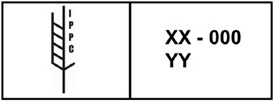Brexit: are your pallets still suitable for the UK?
As you already know, the British Parliament has passed an agreement whereby the United Kingdom (UK) is no longer part of the EU. This agreement has major operational and strategic consequences for international organizations in the UK. Obviously, this also applies to the trading partners and third parties of these partners outside the UK. It is important to limit the risks as a result of Brexit as much as possible and to take a closer look at trade with the UK in order to prevent unwanted conflicts.
Brexit: The state of affairs
The UK is no longer a member of the EU as of January 31, 2020. However, after Brexit will officially come into effect, there will still be a period when all EU rules and laws for the UK will still be in force. This period - called the transition period - is valid until 31 December 2020. After this transition period, new agreements will be made between the EU and the United Kingdom. These agreements will first have to be approved by all EU countries, the European Parliament and the British Parliament.
Direct consequences for pallets and other packaging wood
An immediately noticeable consequence of Brexit is stricter control of goods and substances at the border. When your organisation exports or imports goods from or to the UK that involve packaging wood (eg pallets), this wood must be treated against harmful organisms. In addition, a marking must be visible that proves that it has been treated according to the international standard ISPM15 guideline. Some are even asked for a certificate as proof that the wood has been treated according to ISPM15 standards.
If an inspection service finds harmful organisms on the trade during import or export, measures can be taken. Think of stopping, returning, and having your shipment processed or even destroyed.
What now?
In order to avoid any risk with your trade to and from the United Kingdom, we strongly recommend that you only use packaging wood that has been treated according to the international standard ISPM 15 guideline. This directive will come into force on 31 December 2020 when the transitional period ends. When the (packaging) wood is imported or exported, it will therefore have to comply with the ISPM 15 guideline. This means a heat treatment with a core temperature of 56 °C to destroy the presence of pests in the wood. In addition, the wood must be marked according to international standards (see image). There are four methods that comply with the ISPM 15 guideline.

4 treatment methods
- Heat Treatment (HT)
- Methyl Bromide Treatment (MB)
- Dielectric Heating (DH)
- Treatment with sulfuryl fluoride (SF)
Our method
Pallets bearing our own internationally recognized registration number NL - 029 and the IPPC logo are heat-treated in large ovens at our locations in Son of Maasbracht. This process takes several hours as the temperature rise and falls must be gradual so as not to damage the wood. This treatment, including our existing registration number consisting of a country code (NL) plus manufacturer code (029), makes them suitable for export to the UK and of course other countries with the same import requirements.
View our range of new EPAL Euro pallets and single-use pallets that have been provided with the correct treatment and visible marketing in accordance with international guidelines.
Alternatives: plastic, presswood and cardboard pallets
Of course, we also offer you alternative logistical carriers that do not have to meet the above requirements. View here our ranges of plastic pallets and presswood pallets that are not subject to the ISPM 15 standard. These alternatives each have their own advantages and can offer you an excellent alternative to traditional wooden pallets in some situations.
